George Reuben Ruddick
24th Battalion
Private 65860
| Canadian Infantry 24th Battalion Private 65860 | ||
| Died 21st July 1917 |
George Ruddick's Parents | ||
|
George Ruddick was the son of Charles and Julia Ruddick (née Westcott). Charles (or ‘Charley’) Ruddick was in turn the son of a certain Reuben Ruddick, who at various times was listed as a coal haulier, an ostler and a farmer of a smallholding. Charley grew up in the Rush Hill and Odd Down area; the wider Ruddick family seems to have been something of a fixture here. The 1881 census shows Charley still living with his parents at the age of 26 in a cottage at Rush Hill. An auction notice in the local newspaper six years later (1887) refers to the sale of items from the home of the ‘late Reuben Ruddick’ at Springfield House. | ||
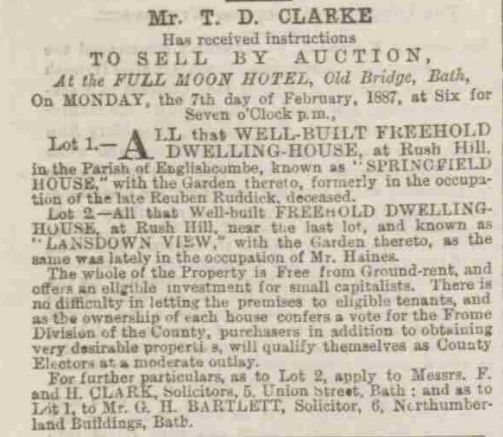 | ||
|
A notice in the Bath newspaper of 1887, detaling the sale of effects of George Ruddick's
late grandfather, Reuben. The Full Moon stood on the site now occupied
by the bus station in Bath and was then at the northern end of the main
bridge into the city centre from the south. |
|
Springfield House is at XX Rush Hill
and still bears the same name today. Julia Westcott was the youngest of four children from a
family who lived at ‘Crossway Cottage’ on Twerton Hill. The old name of
‘Twerton Hill’ relates to what we now know as the area along Whiteway Road,
below Twerton Roundhill and at the top of the Hollow, where older cottages are
still in evidence between later developments. It is not certain where Crossway
Cottage stood, but the main ‘crossway’ in this area is where Englishcombe Lane
crosses the main Rush Hill / Whiteway Road and continues down Padleigh Hill. It
is therefore possible that a cottage stood near this crossroad. This would also
have place the Westcott family very near to the area where the Ruddicks lived
and the families would have been known to each other. Julia’s father, Robert, was a brewer and worked at the
Devonshire Arms, where, in 1869 (when Julia was just 7), he suffered an
accident while at work: Bath Chronicle & Weekly
Gazette, 15th April 1869 FATAL ACCIDENT: On Tuesday evening the City Coroner held an inquest at
the Guildhall on the body of Robert Westcott, 57 years of age, who died at the
Royal United Hospital* the same morning. It seemed that on the 8th
inst. deceased was engaged at the Devonshire Arms, brewing. Before going into
the house to dinner, he went up a five or six step ladder to look into the
copper where the wort was boiling, and from some unexplained cause fell to the
ground. A plasterer named Eskett who was working on the premises went to his
assistance and found that his head was injured. He was taken to the Hospital,
where he was attended by J. Tremearne, the house surgeon, who found that he was
suffering from a fracture of the shoulder blade, and a swelling on the right
side of the head. On Saturday night, ‘delirium tremens’ came on, he got rapidly
worse and died on Tuesday morning. Mr Tremearne said that the ‘delirium tremens’
produced in a man of intemperate habits by the injuries was the cause of death.
Deceased’s son denied that his father was a man of intemperate habits, and one
of the jurymen said deceased was not a man addicted to drink. In answer to the
coroner, Mr Tremearne said it was difficult to distinguish between ordinary
delirium and ‘delirium tremens’, but in the former case the pulse was weak
while in the latter it was quick and full. Deceased exhibited those symptoms,
and therefore he believed it was ‘delirium tremens’ that he suffered from. Mr
Tremearne further said in a man of a delicate habit of body a small quantity of
liquor would induce ‘delirium tremens’; he did not wish to imply that deceased
was a drunken man. A verdict of “accidental death” was returned. * (Note that the RUH was then in Beau Street). In 1881 the Westcott family, with widowed mother Jane earning money as a laundress and Julia’s elder brother Robert (junior) working as a carpenter, were living in a pair of houses at ‘Upper Vale’. It is not known where 'Upper Vale' was. Lyncombe Vale is near the Devonshire Arms and so it is possible that the address was at the upper end of Lyncombe Vale. |
The Ruddick Family |
|
Charley and Julia married at St Mary, Bathwick, in 1887.
They set up home in due course in what is now Englishcombe Lane. |
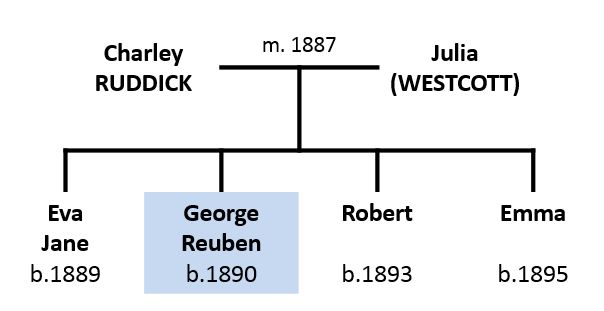 |
|
The four Ruddick children were born at intervals between
1889 and 1895. A fifth child was born and died unnamed in 1897. From the Bath
register of births, we know that George’s middle name was Reuben (same name as
his grandfather) and indeed he appeared on the 1891 census as ‘Reuben G
Ruddick’, so perhaps he was known as Reuben, at least for a time as a child. In 1891, the family (with just the first two children) was
living at Sladebrook Cottages (WHICH WERE THESE)? George’s father, Charles, was listed as
a ‘general labourer’ and all the nearby neighbours were in similar trades as labourers,
stone masons and bricklayers at that time. In 1901 they were listed at Alma Cottage on Englishcombe Lane, where the family settled for several years. The name of this house is listed through the years variously as ‘Elma Cottage’ or ‘Alma Cottage' and later simply as ’47 Englishcombe Road’ (the portion in Twerton Parish leading to Rush Hill was called Englishcombe Road for a time, later reverting to ‘Englishcombe Lane’). George’s mother was listed as a ‘laundress’, bringing in some income in addition to his father who was working as a stone mason. Alma Cottage is no more and has been replaced by a pair of relatively modern houses. |
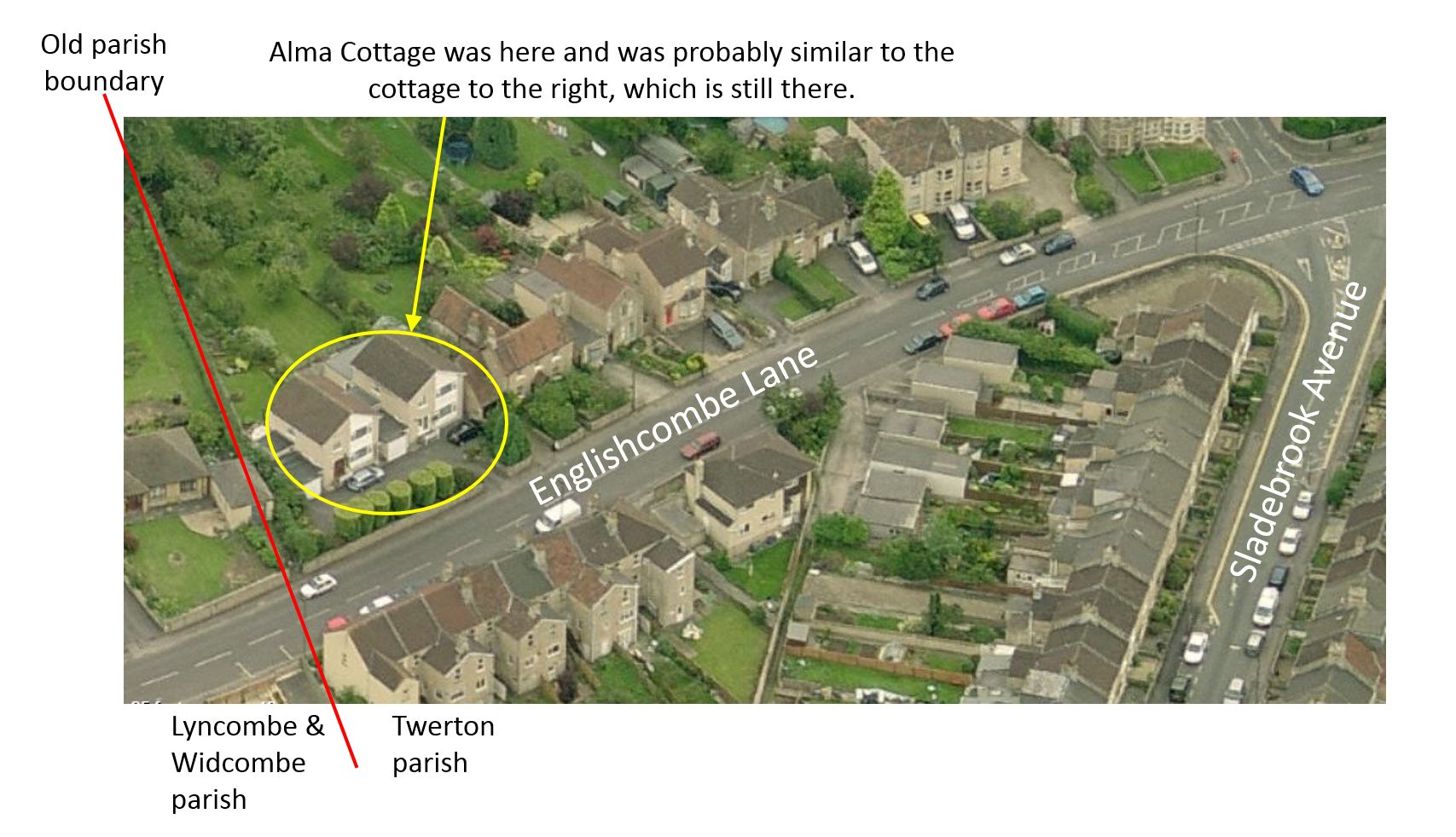 | ||
|
The location of the Ruddick family at Alma Cottage, Englishcombe Lane |
|
Intriguingly, there is no sign of George’s younger sister
Emma on the 1901 census. She would have been about 6. Checks show that she was
not living with other family members. The Bath death register shows the death
of a girl called Dorothy Ruddick in 1895 aged 0. The birth registers do not
show the birth registration of a Dorothy Ruddick; it is therefore possible that
this is a rare example of where a child’s name was changed (perhaps informally)
by the parents after the registration of the birth and the subsequent death was
then registered in the new name. The 1911 census shows that George had followed his father into the stone masonry trade and that his eldest sister, Eva, was in service in a house called Caerbadon in Cleveland Walk, Bathwick, with the (appropriately-named) Stone family, whose head was a stone merchant called Alfred Stone. It is perhaps significant, in terms of later events, that Charley, George’s father, is listed in the 1911 census as ‘stone mason out of work’. Perhaps times became difficult for the family. Sailing for Quebec Two years later, in 1913, the passenger lists for the SS
Royal George – a large steam ship that plied between Avonmouth and Quebec,
operated by the Canadian Northern Railway Company – show that both Eva and George had chosen to seek their fortune
in Canada. On 17th June 1913 they sailed from Avonmouth, arriving
one week later on the 24th in Quebec City, then sailing on to
Montreal to arrive the following day, the 25th June. This 17th June voyage was a return to service for
the SS Royal George, which had been damaged in November 1912 when stranded near
Quebec and had spent some time in repairs in Halifax (Nova Scotia, Canada)
prior to resuming its usual transatlantic route. |
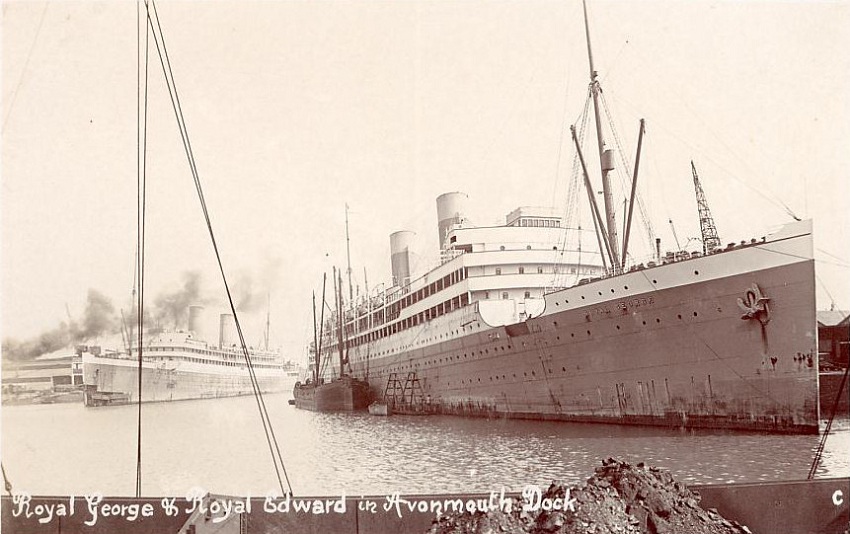 | ||
|
This
photograph of the SS Royal George and (foreground) sister
ship SS Royal Edward was taken at Avonmouth, the port where Eva and
George
boarded their voyage for Canada in 1913. The photograph is known to
date from the period after the Edward sustained damage in November
1912; it could even be the day George Ruddick embarked! |
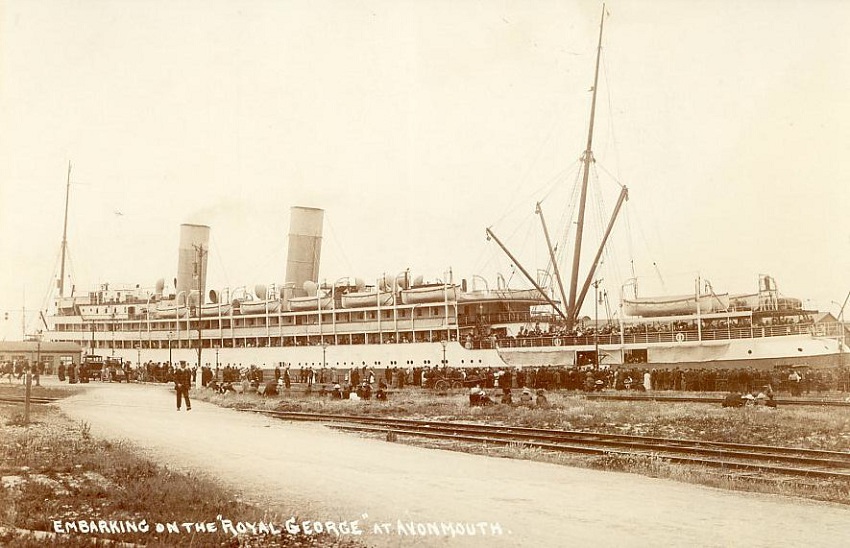 | ||
|
This image of the Royal George shows passengers boarding at Avonmouth and
taking leave from loved ones, in a scene which Eva and George would have
experienced in a very similar way. |
|
Back
at home in Bath in August of the following year (1914) the family
suffered the death of
father Charley. He died in the asylum in Wells; this was a ‘hospital’
for those
with mental health conditions, such as depression. It is not clear
whether there was a link between a possible mental health issue and his
'out of work' status in the 1911 census. |
George Ruddick in WW1 | ||
Canadian Infantry
We know that George enlisted with the Canadian Infantry. His attestation papers survive and reveal a number of details, namely:
The SS Royal George and SS Royal Edward were used to transport the Canadian Expeditionary Force to England for a period, later being
taken over as a British troop ship. Both the SS Royal George and SS Royal Edward were pressed into service in the War effort, including the transport of troops to Gallipoli in July 1915. The SS Royal Edward was sunk by a German U-Boot in August 1915 while sailing to Mudras, with the loss of over 1,000 lives. George served with the 24th Battalion of the Canadian Infantry, which was with the 5th Canadian Infantry Brigade. The diaries of the 24th Bn are online:(More details pending). | ||
George Ruddick's Death | ||
| To do. | ||
Decoration |
|
[Need to look into which medals were awarded to Canadian soldiers]. |
Burial |
|
Loos Cemetery It appears that George Ruddick was originally buried in Corkscrew British Cemetery, which contained 168 British soliders and 38 from Canada. Burials were transferred to Loos Cemetery after the Armistice. The great majority of the soldiers buried here were killed in the Battle of Loos (1915). The cemetery was begun by Canadian forces. Loos British Cemetery [Photo: www.ww1cemeteries.com] |
Commemoration | ||
 In addition to his commemoration on the South Twerton School memorial, George Ruddick is commemorated as follows: | ||
|
Bath War Memorial George Ruddick's listing on the Bath War Memorial bears the incorrect initials, if indeed the inscription is intended for George. By the time the Bath War Memorial was erected, it is not certain that there were any family members alive in the Bath area (brother Robert is the only possible) and there may have been a mistake in the details put forward by someone else who suggested George for inclusion. | ||
 |
|
Canadian Book of Remembrance George Ruddick is listed in the national Book of Remembrance. | ||
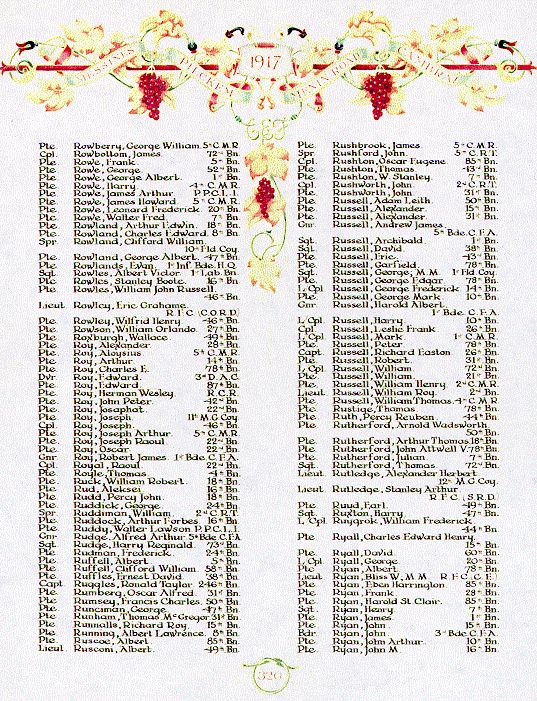 |
|
Montreal Roll of Honour George Ruddick is listed on the Montreal Roll of Honour, which can be viewed online. http://www.archive.org/stream/calltoarmsmontre00sanduoft/calltoarmsmontre00sanduoft_djvu.txtThe listing is not strictly alphabetical; George's name appears in the right-hand column of p87, about two thirds of the way down. This has him listed with 5th Royal Highlanders .Other references put him with 24th Bn of the Infantry. This may be cleared up by the explanation in this volume: "The (5th Royal Highland) Regiment has, in addition, supplied 7 officers and 410 men, or almost half, of the 24th Provisional Battalion Victoria Rifles of Canada", but more work needs to be done to establish the facts. | ||
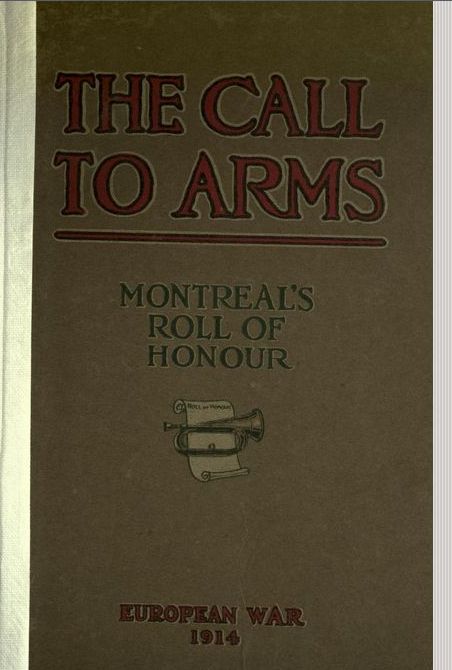 | ||
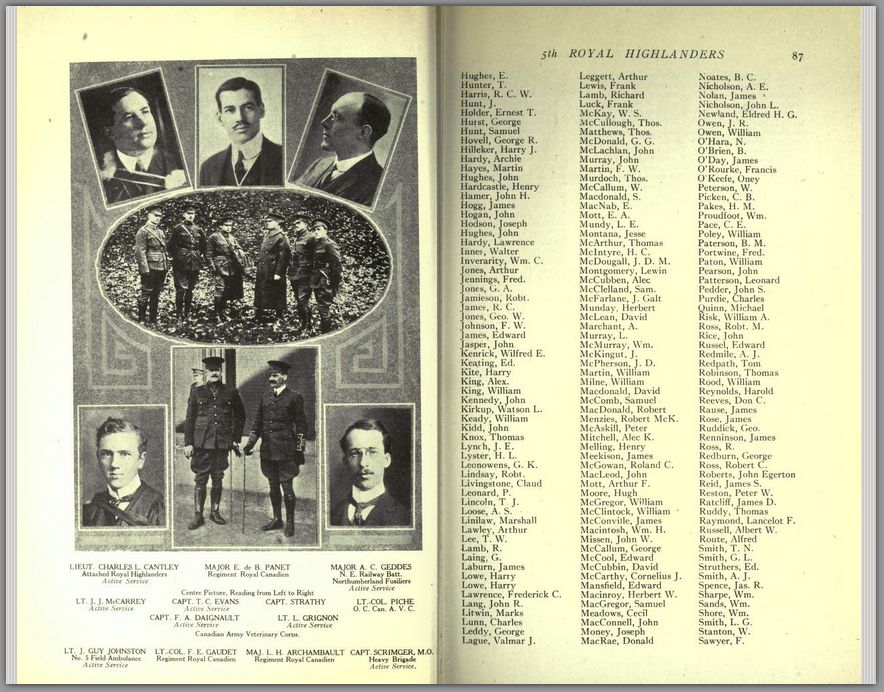 |
Further Information |
After the WarGeorge’s mother
died in 1919 and the grave she shares with George’s
father is on the very eastern edge of St James’ cemetery, on the Lower Bristol Road. | ||
| The grave of George Ruddick's parents in St James's Cemetery. The inscription reads: Sacred to the memory of Charles Ruddick who died August 28th 1914 aged 59 years. Also of Julia beloved wife of the above who died March 9th 1919 aged 54 years. Peace, perfect peace | ||
Living RelativesIt would be great to hear from any living relatives of George Ruddick.We know George's sister Eva emigrated to Canada with him in 1913. An Internet search has turned up a reference to the grave pictured below, bearing Eva's name and the correct date of birth. This shows that she married a Gilbert Bragg, but appears to have retained her surname. We don't know whether there are descendants in Canada. This grave is in Toronto and we do not know how soon after immigration Eva moved on from Montreal to Toronto. | ||
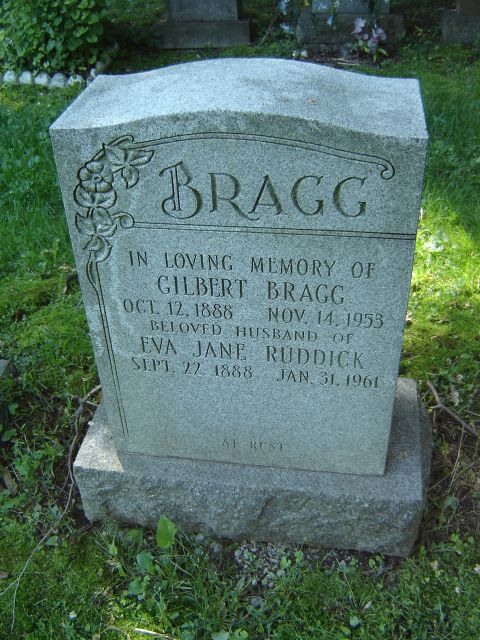 | ||
Brother Robert served in WW1 with the Marines and later married Minnie Amelia Russell in Bath in 1920. They had a son in Bath in 1921 (George Robert), but he died in infancy. Please Get in Touch!If you have any further information on George Ruddick, or want to suggest corrections / improvements for this page, please use the Contact page to get in touch.All additions and further information will be credited appropriately. AcknowledgementMany thanks to Mr David Carter for supplying the photograph of George Ruddick. |